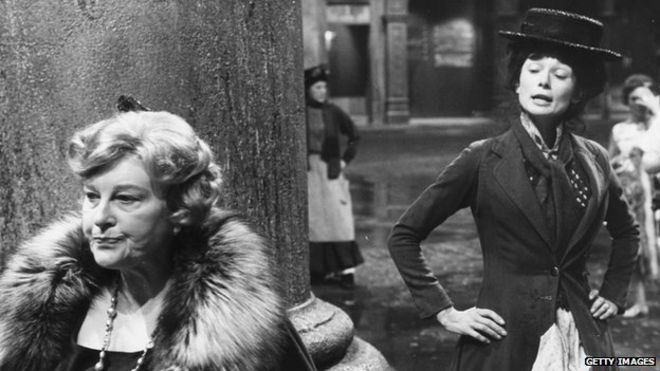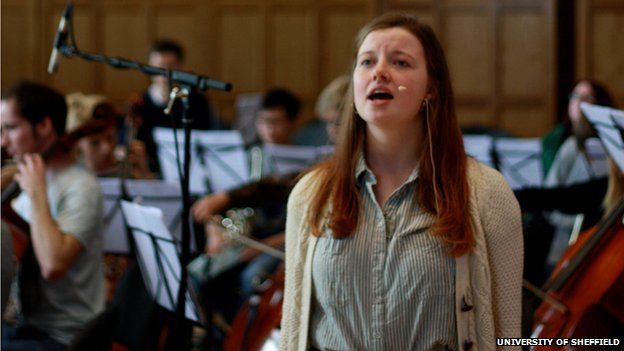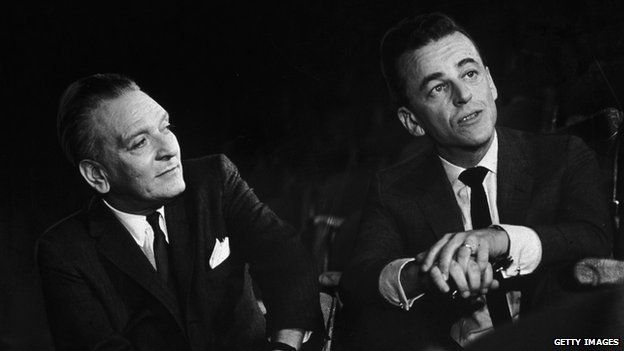
Audrey Hepburn (right) played Eliza Doolittle in the 1964 film version of My Fair Lady
Seven songs dropped from the musical My Fair Lady will be heard in public for the first time in almost 60 years when they are performed later.
Composers Frederick Loewe and Alan Jay Lerner cut two songs and a ballet from the show after the first night in 1956.
Five more numbers had been dropped before the show even reached the stage.
The scores were found in an archive by the University of Sheffield’s Dr Dominic McHugh and will be performed during a special concert in Sheffield.
Dr McHugh said it was “the most exciting discovery I’ve ever made”.
He added: “My Fair Lady is such a cultural phenomenon that to find material that belonged to it briefly and was then lost for a good 50 or 60 years was extremely thrilling.”

The rediscovered songs will be performed by University of Sheffield students
The original stage version starred Julie Andrews as Cockney flower girl Eliza Doolittle, who was transformed into an upper-class lady by linguistics professor Henry Higgins, played by Rex Harrison.
The show started out in New Haven, Connecticut, before going on to become a Broadway hit.
The first performance in New Haven included a 15-minute sequence featuring the songs Come to the Ball and Say a Prayer for Me Tonight plus a ballet scene.
But the show was too long, and this sequence was deemed superfluous, so was never performed again.
Come to the Ball was meant to be “Rex Harrison’s big showstopper” after Eliza had shown herself up at Ascot racecourse, according to Dr McHugh.

Frederick Loewe (left) and Alan Jay Lerner were “ruthless” if a song did not fit in
“It had been designed to show off his talents in terms of comic wit and charm,” Dr McHugh said.
“He was trying to persuade Eliza to carry on with the lessons. She came back from this dreadful scene at Ascot and wanted to give up the lessons, and he persuades her in song.
“He says, ‘Come to the ball with me.’ By the end of the song she’s persuaded. The ballet depicts the next series of lessons, and then at the end of the series of lessons she sings Say a Prayer For Me Tonight.”
The songs had been cut for reasons of length rather than quality, Dr McHugh said.
“All the accounts say the show was wonderful at the first preview, but that it went on all night. It really needed that bit of trimming. They were very clever at finding a solution that still worked in dramatic terms.”
Say a Prayer For Me Tonight was later reworked and used in Lerner and Loewe’s 1958 film musical Gigi.
Other songs written for My Fair Lady, including Lady Liza, Please Don’t Marry Me and Shy, were ditched during or before rehearsals and so have never previously been performed.
‘Long, hard road’
Dr McHugh found the scores in boxes at US Library of Congress in 2008.
Lerner’s widow Liz Robertson, who also played Eliza on stage in 1979, said he had “loved” Come to the Ball but the composers had been “ruthless” if a tune did not fit in.
“When a musical which is that perfect comes your way, you always think that’s how it must have been born,” she said. “But of course it wasn’t.
“It was a long, hard road for all the creative team and Alan and Fritz [Frederick] wrote many songs which were either discarded or were put into the show but didn’t last very long.”
After its success on stage, My Fair Lady went on to become a film starring Audrey Hepburn as Eliza, which won eight Oscars in 1965.
Tuesday’s concert, titled Accustomed to Her Face: The Lost Songs of My Fair Lady, will take place at Firth Hall in Sheffield.
BBC
 Q FM Africa's Modern Radio
Q FM Africa's Modern Radio